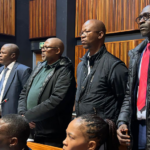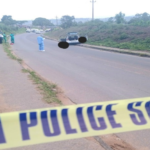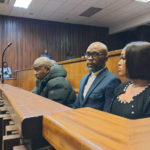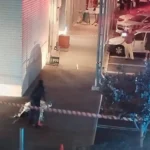The Pretoria High Court heard an urgent application yesterday regarding the controversial instruction issued by National Police Commissioner Fannie Masemola to his deputy, Shadrack Sibiya, to “stay at home” pending an investigation. The instruction has been labelled as “procedural spaghetti,” raising questions about Sibiya’s legal rights.
Judges Nomonde Mngqibisa-Thusi, Norman Davis, and Graham Moshoana were presented with Sibiya’s application to set aside Masemola’s directive and to interdict any “parallel proceedings and action” against him until the conclusion of the Madlanga Commission. This commission has been established to investigate serious allegations of “criminality, political interference, and corruption” within the criminal justice system, prompted by explosive claims made by KwaZulu-Natal police commissioner Nhlanhla Mkhwanazi on July 6.
In a letter dated July 14, Masemola expressed that his office was “gravely alarmed” by Mkhwanazi’s allegations and instructed Sibiya to remain at home while an investigation unfolded. However, Sibiya’s counsel, Kameel Premhid, argued that this instruction was unlawful. He contended that Masemola did not possess the authority under the South African Police Service (SAPS) disciplinary regulations to issue such an order.
Premhid highlighted that, according to SAPS regulations, Sibiya could not be placed on precautionary suspension—essentially what the stay-at-home order represented—without being given an opportunity to make written representations. “Yet there had been no such opportunity,” he stressed, underscoring the procedural lapses involved.
The judges engaged Premhid with questions about Masemola's assertion that the instruction was not a suspension according to SAPS regulations but rather an exercise of his constitutional powers to manage and control the SAPS. “It remains the management prerogative of me, as national commissioner… to order investigations where I deem it necessary,” Masemola stated in his affidavit.
Masemola further defended his decision by arguing that the stay-at-home instruction was essential to prevent Sibiya, “a high-ranking deputy national commissioner,” from being present during the preliminary investigation. He claimed this was necessary to ensure that witnesses could participate freely and voluntarily.
However, Premhid invoked the constitutional principle of “subsidiarity,” arguing that when specific laws exist to regulate the exercise of constitutional powers, Masemola should not bypass these laws in favour of direct constitutional authority. He cited a previous high court judgement that reinforced the idea that SAPS regulations should govern the proper exercise of disciplinary power.
In contrast, Stephanus Coetzee SC, representing the SAPS and Masemola, contended that the instruction to stay at home was not a disguised precautionary suspension, as Sibiya claimed. Coetzee pointed out that Masemola's letter made no reference to any disciplinary process, asserting that the stay-at-home order was not a disciplinary matter at all.
Coetzee argued that the constitution, the SAPS Act, and the general regulations governing the police all grant the national commissioner the authority to manage the police force. He emphasised that police commanders have the power to issue lawful commands, and not every command requires a specific legal provision to be valid. Masemola, as the highest-ranking officer in the country, was entitled to instruct Sibiya to stay at home, Coetzee maintained.
As the legal arguments unfolded, the judges were tasked with determining the legality of Masemola’s actions and whether Sibiya’s rights had been infringed upon. The outcome of this case could have significant implications not only for Sibiya but also for the broader governance and accountability within the South African Police Service.
The Madlanga Commission's investigation is set to unveil crucial insights into the allegations of corruption and misconduct within the criminal justice system, making the stakes high for all parties involved. As the court deliberates on the matter, the police force and the public await clarity on the legal frameworks that govern police conduct and oversight.
With the case still ongoing, the focus remains on the intersections of law, power, and accountability within South Africa’s police service, and whether the established regulations can withstand scrutiny in light of these serious allegations.
“Tell us what you think about this story in the comments!”

Follow Us on Twitter











